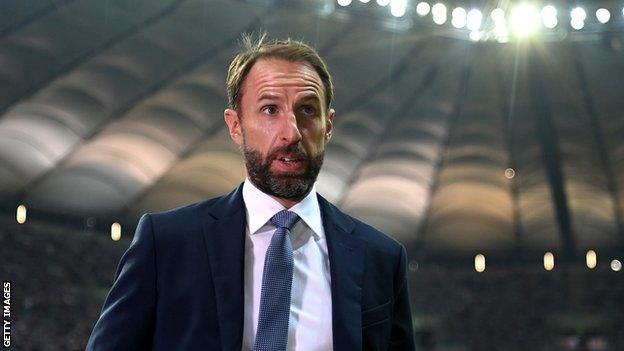Qatar 2022 World Cup: Gareth Southgate says some England fans not travelling 'a great shame'
- Published

Southgate's side were runners-up at Euro 2020 after losing to Italy on penalties in the final
It is "a great shame" that some England fans will not travel to the 2022 World Cup, says manager Gareth Southgate.
Homosexuality is illegal in Qatar and there are strict anti-LGBTQ+ laws.
"We stand for inclusivity as a team - that's been the big driver of a lot of the stances we've taken in the last couple of years," said Southgate.
"It would be horrible to think some of our fans feel they can't go because they feel threatened or they're worried about their safety."
There are also concerns about Qatar's human rights record.
"There are the issues that potentially threaten our fans when they travel - the rights of women and the rights of the LGBTQ+ community in particular," said Southgate.
"Sadly, through discussions that I've had, I don't think some of those communities are going to go and that's a great shame."
Equality campaign group Kick It Out has formed, external a working group to look at inclusivity issues in Qatar.
A report in the Guardian, external last year said 6,500 migrant workers have died in Qatar since the World Cup was awarded in 2010.
Qatar did not comment on those figures, which it disputes, but has said: "We deeply regret all of these tragedies and investigated each incident to ensure lessons were learned."
In November, Amnesty International released a report accusing the country of failing to implement its own laws designed to improve conditions for migrant workers.
The Qatar government has said it "rejects" Amnesty's assertion.
Norway, Netherlands and Germany players have protested about alleged human rights abuses in Qatar.
"I'm quite clear on the areas of concern about this tournament," said Southgate.
"The building of the stadiums was the first and there's nothing we can do about that now. They're built.
"There are obviously ongoing concerns about the rights of workers and the conditions they live in and those areas.
"It seems universally accepted that it's better than it was but not in the position where people think it could be. And maybe policies that have been put in place are not always enforced as they might be."
Southgate, who will travel to to Doha for the World Cup draw next month, is expected to talk to his squad about the issues in Qatar before friendlies against Switzerland and Ivory Coast at Wembley on 26 and 29 March respectively.
"I don't think it's something where we're just going to be able to come out with a statement that will satisfy everything," said Southgate.
"This is different to taking the knee and the importance we felt on that.
"We're not saying this is any less important.
"We feel the World Cup is an opportunity to highlight some of these issues and we have a platform to be able to do that. We've also got to do that in a responsible way.
"I'm not sure that just wearing a T-shirt makes a difference. I don't totally know what we can do in every aspect to make a difference. We have to be realistic about what that might be."
"I don't think any of us are complacent about any of it. I'm certainly taking it very seriously.
"I want to make sure the players are protected. I want to make sure they are able to use their voice in the right way, but I also don't want them to be used with broader agendas at play, perhaps.
"So it's going to be complicated. And I think we're going to get some criticism whatever we do, but we're going to try to do the best that we can."

